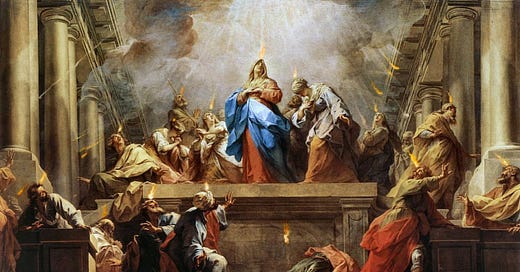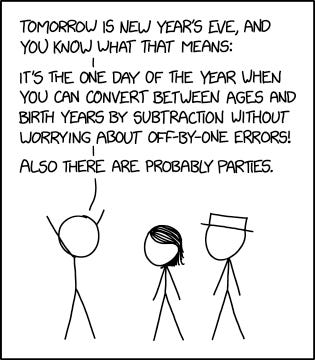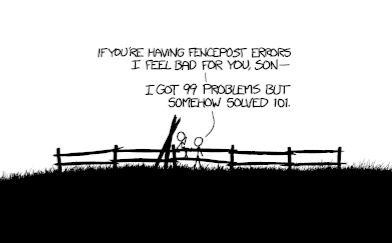Math is hard, especially when dealing with dates, the calculation of which tends to cause fencepost errors.
Lent is supposed to be forty days, but when you look at the calendar from Ash Wednesday to Holy Saturday, it’s actually forty six. That’s because we don’t count Sundays as part of Lent; every Sunday is a “little Easter.”
Pentecost comes from the Greek pentēkostē, meaning fifty, for the fifty days after Easter. Or is it of Easter? Are you supposed to count Easter as the first day? Do you count today?
And don’t get started on how many days are between Easter and the Ascension.
Anyway, yes, if you count every day from and including Easter to and including Pentecost, you get 50, or 8 weeks plus 1 day.
I spent way too much time looking at calendars to figure this out. Let’s talk about the readings.
Reading I
Acts 2:1-11
When the time for Pentecost was fulfilled, they were all in one place together. And suddenly there came from the sky a noise like a strong driving wind, and it filled the entire house in which they were. Then there appeared to them tongues as of fire, which parted and came to rest on each one of them. And they were all filled with the Holy Spirit and began to speak in different tongues, as the Spirit enabled them to proclaim.
Now there were devout Jews from every nation under heaven staying in Jerusalem. At this sound, they gathered in a large crowd, but they were confused because each one heard them speaking in his own language. They were astounded, and in amazement they asked, “Are not all these people who are speaking Galileans? Then how does each of us hear them in his native language? We are Parthians, Medes, and Elamites, inhabitants of Mesopotamia, Judea and Cappadocia, Pontus and Asia, Phrygia and Pamphylia, Egypt and the districts of Libya near Cyrene, as well as travelers from Rome, both Jews and converts to Judaism, Cretans and Arabs, yet we hear them speaking in our own tongues of the mighty acts of God.”
This is one of those passages that should make it clear the Biblical authors were not literally transcribing dialogue as it was spoken. No one talks like this. If you’ve ever served as a lector on Pentecost, you’d know this is one of the most awkward paragraphs in Acts. So it’s obvious that Luke is describing a situation he didn’t personally witness. He’s trying to capture the sense of pandemonium as the Apostles begin speaking in tongues.
But why focus so much on the crowd, instead of our main characters, the Apostles? Luke wanted to draw a parallel to the confusion at the Tower of Babel.1 God had sown confusion among the people for trying to reach Heaven.
Now, on Pentecost, the Holy Spirit reached down to Earth, and brought the people together. Everyone, everywhere can now come together, thanks to the Gospel.
Responsorial Psalm
104:1, 24, 29-30, 31, 34
R. Lord, send out your Spirit, and renew the face of the earth.
Bless the LORD, O my soul!
O LORD, my God, you are great indeed!
How manifold are your works, O LORD!
the earth is full of your creatures.
R. Lord, send out your Spirit, and renew the face of the earth.
May the glory of the LORD endure forever;
may the LORD be glad in his works!
Pleasing to him be my theme;
I will be glad in the LORD.
R. Lord, send out your Spirit, and renew the face of the earth.
If you take away their breath, they perish
and return to their dust.
When you send forth your spirit, they are created,
and you renew the face of the earth.
R. Lord, send out your Spirit, and renew the face of the earth.
When we’re born, the doctor turns us upside down, slaps our bum, and we take our first breath.
Your first breath. It’s not a one-time thing. You have to keep doing it.
The same with God’s breath (the same word as “spirit” in Hebrew), which created the world with a Word, and continues to exist because God wills it. So we ask God to continue sending forth His Spirit, to renew the face of the earth.
Reading II
1 Cor 12:3b-7, 12-13
Brothers and sisters: No one can say, “Jesus is Lord,” except by the Holy Spirit.
There are different kinds of spiritual gifts but the same Spirit; there are different forms of service but the same Lord; there are different workings but the same God who produces all of them in everyone. To each individual the manifestation of the Spirit is given for some benefit.
As a body is one though it has many parts, and all the parts of the body, though many, are one body, so also Christ. For in one Spirit we were all baptized into one body, whether Jews or Greeks, slaves or free persons, and we were all given to drink of one Spirit.
How do you tell the difference between being possessed by a demon and being moved by the Holy Spirit? By the fruits of the experience.
Just like we’re all from different parts of the world and from different walks of life, we all have different gifts;2 we know they’re from God when we use them to to serve others. That service brings us together, into one body.
One such example3 is the Apostles speaking ever language on Pentecost. They’re collecting believers into the body of Christ, which we now call the Church.
Alleluia
R. Alleluia, alleluia.
Come, Holy Spirit, fill the hearts of your faithful
and kindle in them the fire of your love.
R. Alleluia, alleluia.
We heard a wonderful story of the Holy Spirit coming down in fire to the Apostles. It’s not wrong to pray for the same thing for ourselves.
Gospel
Jn 20:19-23
On the evening of that first day of the week, when the doors were locked, where the disciples were, for fear of the Jews, Jesus came and stood in their midst and said to them, “Peace be with you.”
When he had said this, he showed them his hands and his side. The disciples rejoiced when they saw the Lord. Jesus said to them again, “Peace be with you. As the Father has sent me, so I send you.”
And when he had said this, he breathed on them and said to them, “Receive the Holy Spirit. Whose sins you forgive are forgiven them, and whose sins you retain are retained.”
Remember a couple of weeks ago, when we were reading the Farewell Discourse in parts across several days? At one point, Jesus said, “Peace I leave with you; my peace I give to you.”
Now, reappearing to them after the Resurrection, Jesus echoes those words. He wants to assure them He is who He says He is.
Just as God the Father breathed life into Adam, Jesus breathes his Holy Spirit onto the Apostles. Then, he sends them out into the world, to bring gifts of the spirit—forgiveness of sins.
It is a little weird that Jesus tells the Apostles, “receive the Holy Spirit”, yet they are also “filled with the Holy Spirit” on Pentecost, after the Ascension. The simple answer is, we never stop receiving the Holy Spirit. Even when our hearts our filled, our hearts can still grow.
Which Paul lists (1 Cor 12:8-11) but are omitted from this reading: wisdom, faith, mighty deeds, prophecy, discernment of spirits, speaking tongues, interpretation of tongues.
Which again, this reading skips for no reason I can tell.









: ) To help with your math---it's 8 Sundays but only 7 weeks + 1 day. Thank you for your reflections ... very helpful.